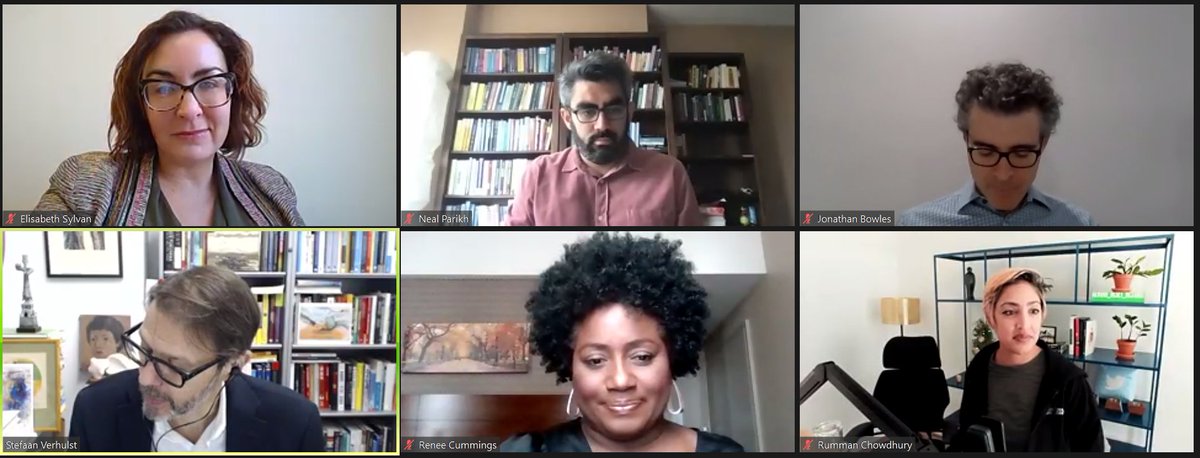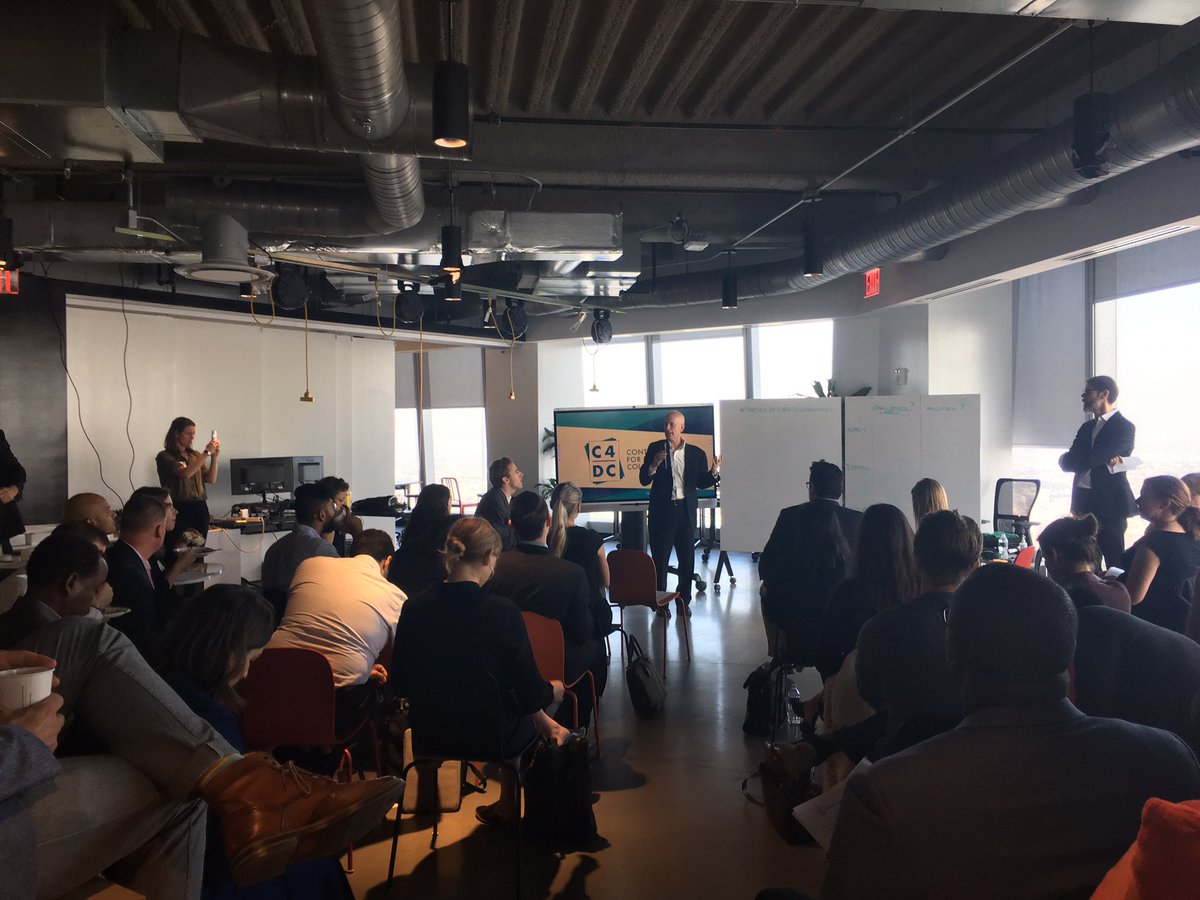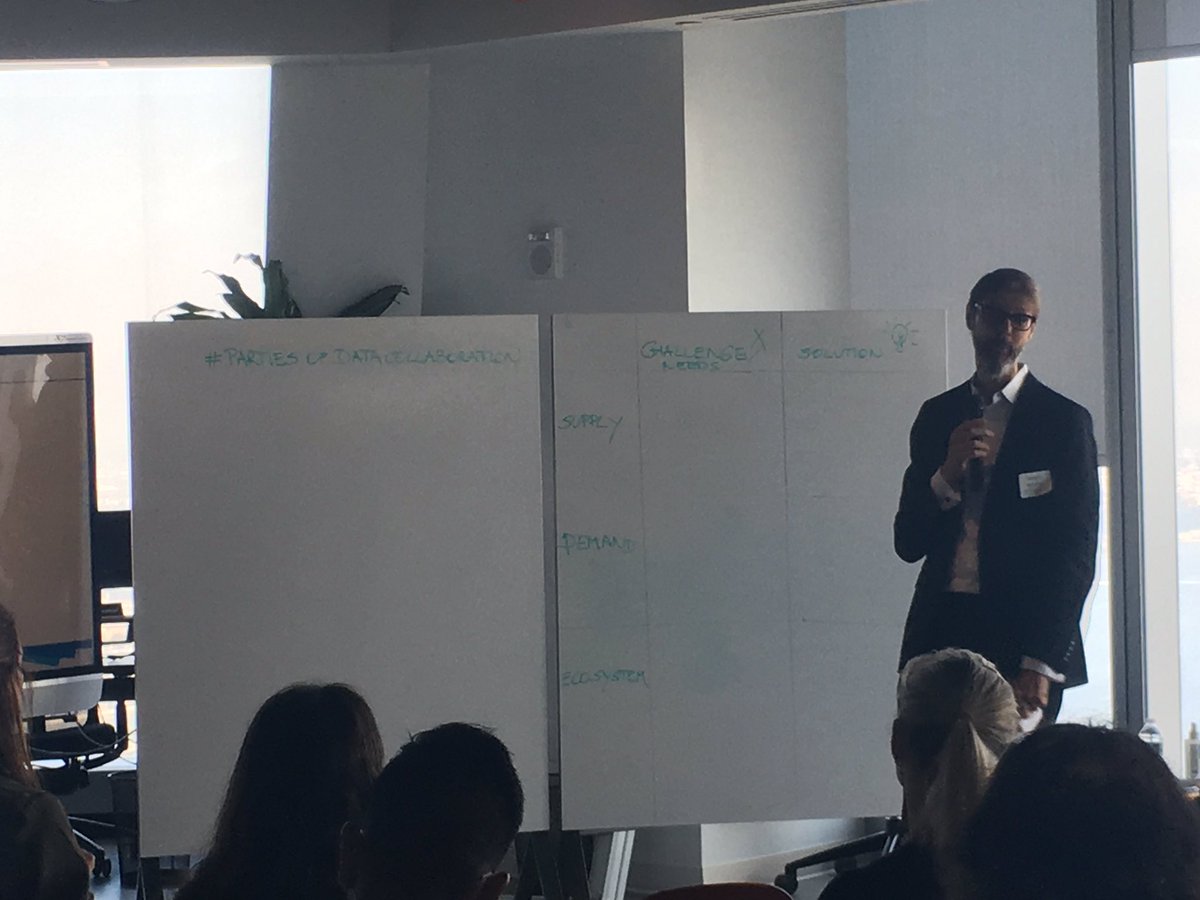
@sverhulst opens by explaining the #AI strategy and #data infrastructure. He notes how NYC is becoming a leader on AI strategy and provides an interesting precedent for global AI governance.
Stefaan introduces:
* @npparikh, NYC Mayor’s Office of the CTO
* @jbowlesnyc, Center for an Urban Future
* @CummingsRenee, Residence at the U of Virginia
* @lisard, Berkman Klein Center for Internet & Society at Harvard University
* @ruchowdh Twitter
* @npparikh, NYC Mayor’s Office of the CTO
* @jbowlesnyc, Center for an Urban Future
* @CummingsRenee, Residence at the U of Virginia
* @lisard, Berkman Klein Center for Internet & Society at Harvard University
* @ruchowdh Twitter

Neal explains that the primary audience for this panel is inward focused, for those in gov and those who interact with it.
The major components are educational (informing what AI is), describing ecosystem in NYC, and describing findings and opportunities.
The major components are educational (informing what AI is), describing ecosystem in NYC, and describing findings and opportunities.

This last section, he says, was assembled in coordination with universities, small businesses, NGOs, and other stakeholders.
Findings and opportunities has five themes:
1. City #Data Infrastructure: Improving current systems
2. City Applications: case studies of #ML & #AI applications
3. Policy and Gov: How systems regulated
4. Partnerships: Working with institutions outside gov
5. Business Education
1. City #Data Infrastructure: Improving current systems
2. City Applications: case studies of #ML & #AI applications
3. Policy and Gov: How systems regulated
4. Partnerships: Working with institutions outside gov
5. Business Education
Stefaan explains his view: Strategy has three components:
1. Educational: informing leaders of potential and risks of AI for gov;
2. Descriptive: explaining the current state of play in NYC
3. Directional: providing a roadmap for future application
1. Educational: informing leaders of potential and risks of AI for gov;
2. Descriptive: explaining the current state of play in NYC
3. Directional: providing a roadmap for future application
@ruchowdh says that the strategy is a good resource.
"It's written from the perspective of a municipal administrator whho has a job to do and machine learning is one tool to accomplish that. All too often, these documents are written from the perspective of engineers."
"It's written from the perspective of a municipal administrator whho has a job to do and machine learning is one tool to accomplish that. All too often, these documents are written from the perspective of engineers."
She also notes that it puts administrators on equal footing with those developing tech.
The power dynamic is that business providers with non-transparent algorithms have more power than those than those familiar with the context.
The power dynamic is that business providers with non-transparent algorithms have more power than those than those familiar with the context.
Is this broadly applicable? Yes.
She says it's especially helpful that this is a local guide because federal guidance is often not applicable for lower rungs of government. The structures are very different.
She says it's especially helpful that this is a local guide because federal guidance is often not applicable for lower rungs of government. The structures are very different.
.@lisard emphasizes the value of the strategy & discusses next steps for this work.
There's a lot of richness in examples so the next question is implementation and how we think about the trade-offs on principles we want to work with, engagements on the ground, etc.
There's a lot of richness in examples so the next question is implementation and how we think about the trade-offs on principles we want to work with, engagements on the ground, etc.
@CummingsRenee provides her take on the strategy saying she likes the way it looks like a living document.
"It's something that is continually growing and more information can be added as it comes to the fore."
"It's something that is continually growing and more information can be added as it comes to the fore."
She continues: "I also really like the robust approach when it comes to stakeholder engagement and expand the definition of decision makers and I'm really looking forward to how far we expand [this]."
"I also really like the way we democratize this technology."
"I also really like the way we democratize this technology."
.@CummingsRenee: "[I am] looking much more to community engagement and an expansion of the concept of digital rights and spending a time to focus on human rights. Let's see how we can move to actionable steps and getting real benefits out of it."
Jonathan says that he was impressed with the document and the way it considers needs of leaders.
"I don't think that folks in city government are aware of AI is or what the specific opportunities are."
"I don't think that folks in city government are aware of AI is or what the specific opportunities are."
"They might have heard the fear-mongering but [...] finding all the opportunities here can show the ways that AI can improve the economy [...] while safeguarding privacy and rights."
Stefaan asks Rumman about the role of AI ethics plays in helping make this strategy actionable? How do you integrate AI ethics into communities of practice?
"AI Ethics is critical here because AI is being used for public services. That means the premise is quite different."
"AI Ethics is critical here because AI is being used for public services. That means the premise is quite different."
"When we are building these systems for government, we want them to be useable by everyone [...] not just marketable groups. This actually has to work for everyone."
The concept of inclusion and bringing in traditionalized groups and the history of marginalization is essential.
The concept of inclusion and bringing in traditionalized groups and the history of marginalization is essential.
She notes that we need to find a common set of clearly defined terms for the field to avoid ethical problems. What do we mean by bias? What do we mean by users?
Important to define what systems should do and what they should *not* be doing.
Important to define what systems should do and what they should *not* be doing.
Stefaan asks for @CummingsRenees view on integrating #data ethics into
"Data ethics is about data justice and it's always about looking for algorithmic injustice. [...] That means being diligent and vigilant about looking how AI affect communities."
"Data ethics is about data justice and it's always about looking for algorithmic injustice. [...] That means being diligent and vigilant about looking how AI affect communities."
She notes that many communities have probably been harmed by AI.
"One of the things I like to do is ask myself ,of the communities I represent, how many are on top of these issues?"
It requires some data and #AI literacy.
"One of the things I like to do is ask myself ,of the communities I represent, how many are on top of these issues?"
It requires some data and #AI literacy.
Ethics has got to be the navigating force as we move into the future, says Renee.
"We have got to live in the ethical moment. The thing about AI for me is not about what we know about the technology but what we do not know about the technology."
"We have got to live in the ethical moment. The thing about AI for me is not about what we know about the technology but what we do not know about the technology."
Elisabeth echoes Renee's comments.
"How do we have conversations that lead to appropriate decisions and in many cases change that will allow cities and other levels of governmental organizations to consider the perspectives that might now be the first that come to mind?"
"How do we have conversations that lead to appropriate decisions and in many cases change that will allow cities and other levels of governmental organizations to consider the perspectives that might now be the first that come to mind?"
She describes her org's work to act on this by thinking about engagement at multiple stages.
"It's important that there's a scholarly and an activist investigation and then in addition to that, the communities who will be impacted, are engaged in ways they can participate."
"It's important that there's a scholarly and an activist investigation and then in addition to that, the communities who will be impacted, are engaged in ways they can participate."
.@lisard continues by saying that continued oversight by multiple stakeholders is essential.
"There are predictable outcomes that we know can happen that we must push against. There are also unpredictable outcomes [...] so reflection is important throughout the process."
"There are predictable outcomes that we know can happen that we must push against. There are also unpredictable outcomes [...] so reflection is important throughout the process."
Stefaan now moves onto questions of #AI and work. How can we ensure we build a workforce that is trained in issues of algorithms and data?
Jonathan says he is pleased about the focus on workforces and the references to the role of libraries.
Jonathan says he is pleased about the focus on workforces and the references to the role of libraries.
.@jbowlesnyc: "We've really seen a lack of good accessible jobs. We've done research that [...] just 3% of tech jobs in New York are held by black women."
"We need to make sure that more NYers are able to gave access to springboard into these good careers."
"We need to make sure that more NYers are able to gave access to springboard into these good careers."
He continues by noting that many of those most affected by the pandemic are also the most vulnerable.
Significant work needs to be done to provide tech training and to make that accessible to all New Yorkers.
Significant work needs to be done to provide tech training and to make that accessible to all New Yorkers.
Jonathan notes that libraries can play a much larger role in providing people with basic training to help them secure jobs.
"They are a great first step into tech training ecosystem [...] But we're not using them."
"They are a great first step into tech training ecosystem [...] But we're not using them."
Rumman argues that we need to frame this conv the right way. Looking back at some of the predictions on automation, we have not seen mass automation.
What we're seeing is that employers is continuing to exploit workers. They point to automation as a way to absolve themselves.
What we're seeing is that employers is continuing to exploit workers. They point to automation as a way to absolve themselves.
Stefaan talks about the local and the global and the way the NYC Data Strategy can inform orgs around the world. In what way is this an evolving and emerging model for #AI at the local level?
@lisard says that, within the US, NYC has an important role to play. It's a model for others.
It's a place where these kinds of concerns about equity with AI, with employment, all of the key concerns we have will inevitably play out, especially given slowness at federal level.
It's a place where these kinds of concerns about equity with AI, with employment, all of the key concerns we have will inevitably play out, especially given slowness at federal level.
She goes on to emphasize the importance of people being aware of what is happening in other contexts and countries so as to affect change.
Stefaan asks @CummingsRenee about one element from the strategy other cities should adopt as well.
Renee says that stakeholder engagement and the robust approach to stakeholder engagement taken by NYC should be adopted by other countries and cities.
Renee says that stakeholder engagement and the robust approach to stakeholder engagement taken by NYC should be adopted by other countries and cities.
She emphasizes that we need to expand our definition of decision-maker into the communities.
She also urges the strategy to make note of something that New Yorkers value intensely: their freedom.
She also urges the strategy to make note of something that New Yorkers value intensely: their freedom.
Jonathan says that the strategy represents a chance to make government smarter and more capable.
He says that the practical applications will really interest government officials and that the strategy should further emphasize that.
He says that the practical applications will really interest government officials and that the strategy should further emphasize that.
Neal responds to several of the audience questions related to openness around algorithms and algorithmic transparency.
@npparikh says that there's a sister body in NYC to look at how tools interact with communities. City is currently inventorying use of AI across city gov.
@npparikh says that there's a sister body in NYC to look at how tools interact with communities. City is currently inventorying use of AI across city gov.
Neal goes on to emphasize the need to interrogate the purpose of some of the disclosure mechanisms around algorithms and find uses for them.
Stefaan summarizes the panel. The consensus is that the #AI strategy represents a great step forward but should be seen as a living doc.
He notes the need to be intentional with #AI and to understand this is not an abstract convo. Also need to find ways to engage w/ stakeholders
He notes the need to be intentional with #AI and to understand this is not an abstract convo. Also need to find ways to engage w/ stakeholders
And that's the end of the conversation.
Thank you for following along with us. If this discussion interested you, please look at the NYC AI Strategy here: www1.nyc.gov/assets/cto/#/p…
Thank you for following along with us. If this discussion interested you, please look at the NYC AI Strategy here: www1.nyc.gov/assets/cto/#/p…
You can also look at The GovLab's own work on #AI and algorithms in cities by visiting ailocalism.org.
With #AILocalism, we study how local decision-makers can fill gaps left by incomplete state, national or global governance frameworks and promote responsible AI use.
With #AILocalism, we study how local decision-makers can fill gaps left by incomplete state, national or global governance frameworks and promote responsible AI use.
• • •
Missing some Tweet in this thread? You can try to
force a refresh











